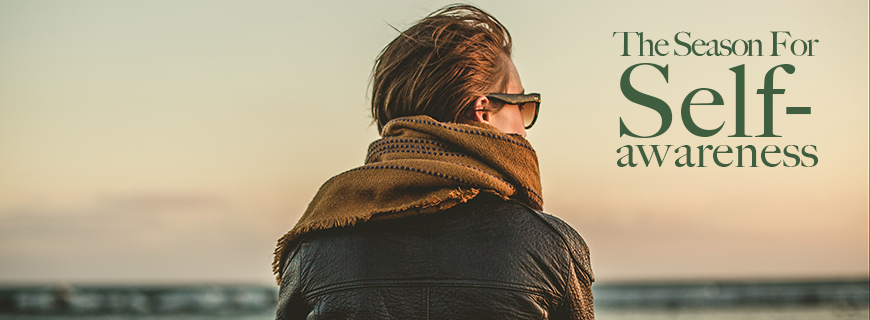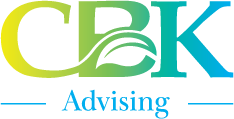The Season For Self-awareness

Last month I talked about social skills and their importance in our lives as far as making our relationships more effective. But before we are able to examine, use and improve those skills, we need to look at ourselves and how others perceive us. We need to develop an awareness of our emotions first by identifying them, then understanding what triggers them and then learning how to make them work for us instead of against us. This may sound simple, but it isn’t. And that’s because it isn’t easy to do these things, and it takes time and practice to get it right.
Emotionally intelligent people possess a healthy amount of self-awareness, along with self-regulation and motivation. These 3 intrapersonal components of EQ help to inform the interpersonal dimensions of empathy and social skills. But self-awareness is the first and most important factor in building EQ skills that will result in the best and most productive relationships you can develop.
Identifying our emotions can often be quite difficult. Although it is easier for some than others, even the most self-aware among us may need help with this now and then. It’s amazing to me, for example, how many of my clients have experienced negative or destructive emotions that were triggered by something as simple as hunger. These are professionals who have very responsible positions and are known for their decisiveness and leadership but, in each case it took some time and investigation to determine the cause of their agitation. Of course, the answer isn’t always so apparent. But, if you are feeling emotionally unhinged and don’t know why, think about when you last ate. You may find that a power bar will be very helpful in returning to your regular self!
Low self-awareness is often the root cause of dissatisfaction with work. Talented people who feel stuck or feel they have been passed over for promotions often turn out to be lacking in awareness about themselves and their effect on others. Once they learn to tune into their emotions, they’re better equipped to understand and alter their behavior and, therefore, alter other people’s perceptions of them. This doesn’t happen overnight but I have seen it happen, over time, for many clients.
Identifying our emotions and what triggers them takes investigation. At this time of year, when stress is increased for nearly everyone, I advise you to take a step back and think about how you feel. Do the holidays increase your feelings of stress? How and why? What can you do about it? Does being with family – or not being with family – at this time of year make you uncomfortable? How and why? What can you do about it? Are you sleeping poorly or less than usual? What can you do to change that? Are you eating properly and often enough – or overeating to deal with your emotions? What can you do to improve your eating habits? Is money a problem for you at this time of year due to expectations of yourself or others? What can you do to minimize the negative impact of those expectations?
Self-awareness is the ability to recognize and understand your moods, emotions and drives, as well as their effect on others. It is knowing how you are feeling and why you feel that way. But, beyond that, self-awareness is the ability to take this data about yourself and use it to improve your life. If you answered the questions above and thought through actions you could take to minimize stress and negative emotions during the holidays, you are using the data to help yourself. This is part of self-awareness. It’s knowing how to alter your behavior, if necessary, to improve your relationships and your own well-being.
Once you have taken the time you need to identify your emotions in a given situation and to understand what triggered them, you can begin to use what you’ve learned to change the outcome. Eventually you’ll know what to do before you find yourself in a situation that is similar to one that triggered negative emotions. You will know how to handle it or avoid it so that the outcome won’t be what it has been in the past. Or, if you’re already feeling negative emotions and want to change the outcome, you can step back and remind yourself of the trigger that brought you to that moment. Maybe you need to walk away, or reschedule a meeting, or just make a conscious decision to regroup and move past it.
A significant aspect of self-awareness is knowing your personal strengths and limits and having an accurate sense of your self-worth and capabilities. Sometimes smart people are too smart for their own good and end up getting in their own way. What I mean by that is we should all try to excel in the areas where we’re of most value to others and let others handle the areas where we have less expertise. Or, when we have expertise in many things but not enough time to do them all justice, let others handle some of the responsibilities. Otherwise, we’re not making good use of the data we’ve gained through being self-aware and our friends, family and colleagues are likely to feel frustrated.
I recently saw the movie about Steve Jobs and was reminded again about his reputation, which I mention in my book. Mr. Jobs was the perfect example of a great leader who, although he lacked empathy, was high in self-awareness. His self-awareness didn’t lead him to make changes in his behavior, however. He didn’t strive to be more empathetic nor did he apologize for his often callous remarks. But he made sure others who were better at social skills and empathy were directly leading the people at Apple while he focused on strategy. Mr. Jobs was about vision and innovation and imagination, and he let those with social skills focus on the people. The rest is history. Mr. Jobs is no longer with us but Apple continues to thrive.
I guide my clients on some simple ways to become more self-aware, and they tell me these tips are helpful so I’ve included two here:
- First, set a timer for five random times throughout the day. When the timer goes off, write down how you feel. Look at your responses at the end of the day and try to determine how your mood impacted, or was impacted by, what occurred during the day.
- Make a list of what you believe to be your strengths and weaknesses. Then, ask a trusted friend or adviser or family member to describe to you what they consider your strengths and weaknesses to be. Compare the two lists. If there are big differences between the two, your self-awareness is probably skewed and you should create an action plan to develop your areas of weakness.
Another helpful hint has to do with how to recover when you realize you’ve just said or done the wrong (un-self-aware) thing. Perhaps you’ve glared at the supermarket Santa while rushing past him because you feel that he and the holiday decorations are out much too early. You might turn around, give him a few dollars and thank him for volunteering to help the less fortunate. You get the idea, right?
Remember that being self-aware is a process and it takes practice. During the holidays, especially, it can help us be our best selves at a time of year that doesn’t always bring out the best in us. Now, before you run off to the mall, take a deep breath and remember, ‘tis the season to be jolly!
May your holidays be peaceful and joyous.

